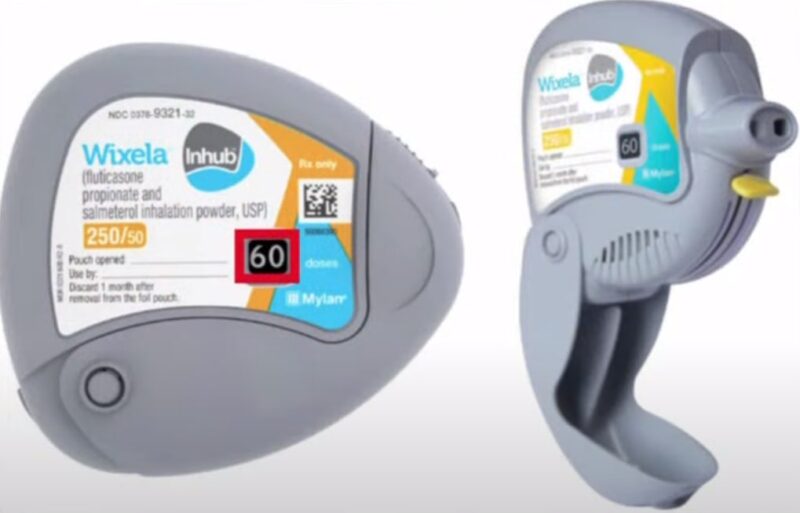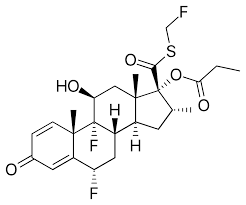The significance of this medication in the healthcare landscape is underscored by its prescription statistics; in 2021 alone, fluticasone was prescribed approximately 25.3 million times in the United States.
This figure is a testament to its widespread use and trust within the medical community. As part of our exploration into fluticasone propionate, this article takes a closer look into its uses, benefits, and side effects, providing a comprehensive understanding for patients and healthcare providers alike.
Key Takeaway
- Fluticasone Propionate is a synthetic steroid that treats allergies and inflammation by reducing swelling and irritation in the affected areas.
- It is used for managing allergies and asthma, offering significant benefits in reducing symptoms, though it may cause side effects like throat irritation and nosebleeds.
Fluticasone Propionate as a medical treatment

Fluticasone Propionate, a synthetic glucocorticoid, is integral to modern medical treatments for a wide range of allergic and inflammatory conditions. Acting to suppress the immune response and reduce inflammation, it is primarily used in the management of asthma, allergic rhinitis, and skin disorders such as eczema and psoriasis.
Its availability in various forms, including inhalers, nasal sprays, and topical creams, allows for targeted therapy, significantly enhancing the quality of life for patients.
The significance of Fluticasone Propionate in treating these conditions lies in its effectiveness in controlling symptoms, preventing exacerbations, and maintaining long-term disease management, making it a cornerstone of therapeutic strategies in allergy and respiratory care.
Interesting fact: Fluticasone Propionate is uniquely structured for high receptor affinity, enabling effective treatment at lower doses with reduced side effects.
How it works?
Fluticasone Propionate operates at the molecular level by binding to glucocorticoid receptors within cells. This interaction initiates a cascade of events leading to the transcription of anti-inflammatory proteins while inhibiting the transcription of pro-inflammatory genes.
It reduces the production of inflammatory mediators such as cytokines, chemokines, and adhesion molecules, which are key players in the body’s inflammatory response.
By targeting these molecular pathways, Fluticasone Propionate effectively reduces the inflammation and immune response characteristic of allergic conditions and asthma. This action helps to alleviate symptoms such as swelling, irritation, and airway constriction, thereby improving breathing and reducing the frequency and severity of asthma attacks and allergic reactions.
Its ability to act directly on the cells and pathways involved in inflammation and immune activation makes Fluticasone Propionate a potent and targeted treatment option for managing and controlling a range of allergic and inflammatory diseases.
Different Forms of Fluticasone Propionate
Fluticasone Propionate is versatile and available in several formulations to treat various conditions effectively:
Nasal Sprays

Used primarily for allergic rhinitis, including seasonal or perennial allergies. Patients administer the spray directly into the nostrils, usually one or two sprays per nostril daily, to reduce nasal congestion, sneezing, and runny nose. Flonase is the commercial name for the nasal spray formulation.
Inhalers

Designed for individuals with asthma or chronic obstructive pulmonary disease (COPD). The inhaler delivers a specific dose of the medication directly to the lungs, reducing inflammation, preventing asthma attacks, and making breathing easier. Dosage varies based on the severity of the condition, with patients typically taking one or two puffs once or twice a day. It is sold under the brand name Flovent.
Topical Creams and Ointments
Applied to the skin to treat various inflammatory skin conditions, such as eczema and psoriasis. The cream or ointment is applied directly to the affected areas once or twice daily to reduce itching, redness, and swelling.
Each form of Fluticasone Propionate is tailored to deliver the medication effectively to the site of inflammation, ensuring targeted relief from symptoms. The choice of formulation and dosing regimen depends on the condition being treated, its severity, and the patient’s overall health profile.
Proper use is crucial for maximizing the benefits while minimizing potential side effects, emphasizing the importance of following healthcare provider instructions closely.
Uses and Indications
Fluticasone Propionate is a versatile medication prescribed for a broad spectrum of conditions, thanks to its potent anti-inflammatory and immunosuppressive properties. Its uses and indications include:
- Allergic Rhinitis – For both seasonal and perennial allergic rhinitis, Fluticasone Propionate nasal sprays are highly effective in managing symptoms like nasal congestion, sneezing, itchy nose, and runny nose, providing relief from the discomfort associated with allergies.
- Asthma – Inhaler forms of Fluticasone Propionate are crucial in the management of asthma. They help in reducing inflammation in the airways, preventing asthma attacks, and maintaining open, clear airways, thus playing a key role in both the acute management of symptoms and long-term control of the disease.
- Chronic Obstructive Pulmonary Disease (COPD) – Used as a component of maintenance therapy for COPD, Fluticasone Propionate inhalers can help reduce the frequency of exacerbations and improve overall lung function in affected individuals.
- Skin Conditions – Topical creams and ointments containing Fluticasone Propionate are prescribed for inflammatory skin conditions such as eczema and psoriasis. They provide relief from symptoms such as itching, redness, and swelling, contributing to the improvement of skin appearance and comfort.
- Nasal Polyps – Nasal sprays containing Fluticasone Propionate can also be used to treat nasal polyps, reducing their size and the associated symptoms of nasal obstruction.
Side effects and complications
Fluticasone Propionate, like all medications, can cause side effects, though not everyone experiences them. These side effects can range from mild to severe, and understanding them is crucial for minimizing risks while using this medication.
Mild Side Effects
The most common side effects may include the following symptoms:
| Side Effect | Description |
|---|---|
| Throat Irritation | Common with inhaler use, leading to coughing or a sore throat. |
| Nosebleeds | Particularly with nasal spray use, due to the local application in the nasal passages. |
| Headache | A relatively common, but usually transient, side effect. |
| Nausea | Some individuals may experience stomach discomfort or nausea. |
| Candidiasis (Oral Thrush) | Inhaler use can lead to fungal infections in the mouth or throat, often preventable with proper oral hygiene after use. |
Moderate to Severe Side Effects
Less common, but more serious symptoms include:
| Side Effect | Description |
|---|---|
| Adrenal Suppression | Long-term use can impact the body’s steroid production, affecting stress response. |
| Growth Retardation in Children | Prolonged use might affect growth, necessitating regular monitoring by healthcare professionals. |
| Bone Density Decrease | Extended use, especially at high doses, may lead to a reduction in bone mineral density. |
| Cataracts and Glaucoma | There is an increased risk of developing eye conditions with long-term use. |
| Immune System Suppression | High doses or prolonged use can suppress the immune system, increasing the risk of infections. |
Minimizing Risks
The importance of proper usage cannot be overstated in minimizing these risks. Sticking to prescribed dosages, using the medication as directed, and regular monitoring by healthcare professionals can significantly reduce the likelihood of side effects. For inhalers or nasal spray forms, proper technique in application can prevent some local side effects like oral thrush or nosebleeds. Patients, especially children and those on long-term therapy should have regular check-ups to monitor growth, bone density, and overall health.
Fluticasone Propionate compared to other glucocorticoids
In comparative studies, Fluticasone Propionate (FP) showed similar or better efficacy and safety compared to other inhaled corticosteroids like Beclomethasone Dipropionate (BDP) and Budesonide (BUD).
FP has higher relative potency and negligible oral bioavailability. While comparable in efficacy to Ciclesonide (CIC), FP has a greater impact on cortisol levels than CIC due to pharmacodynamic and pharmacokinetic differences.
FAQs
How is Fluticasone Propionate used?
Administered via inhalers, nasal sprays, or topical creams depending on the condition.
What are the side effects of Fluticasone Propionate?
Potential side effects include throat irritation, nosebleeds, and possible adrenal suppression.
Can children use Fluticasone Propionate?
Yes, under medical supervision, for conditions like asthma and allergies.
Is Fluticasone Propionate safe for long-term use?
Long-term use requires medical oversight due to potential side effects.
Conclusion
Fluticasone Propionate is a potent glucocorticoid used mainly for treating asthma and allergic rhinitis. It offers significant benefits by reducing inflammation and immune response, leading to improved breathing and decreased allergic symptoms.
Users must be aware of potential side effects like adrenal suppression and local reactions. Its choice over other treatments depends on individual needs, efficacy, and side effect profile. Always consult healthcare professionals for personalized advice and treatment options.
